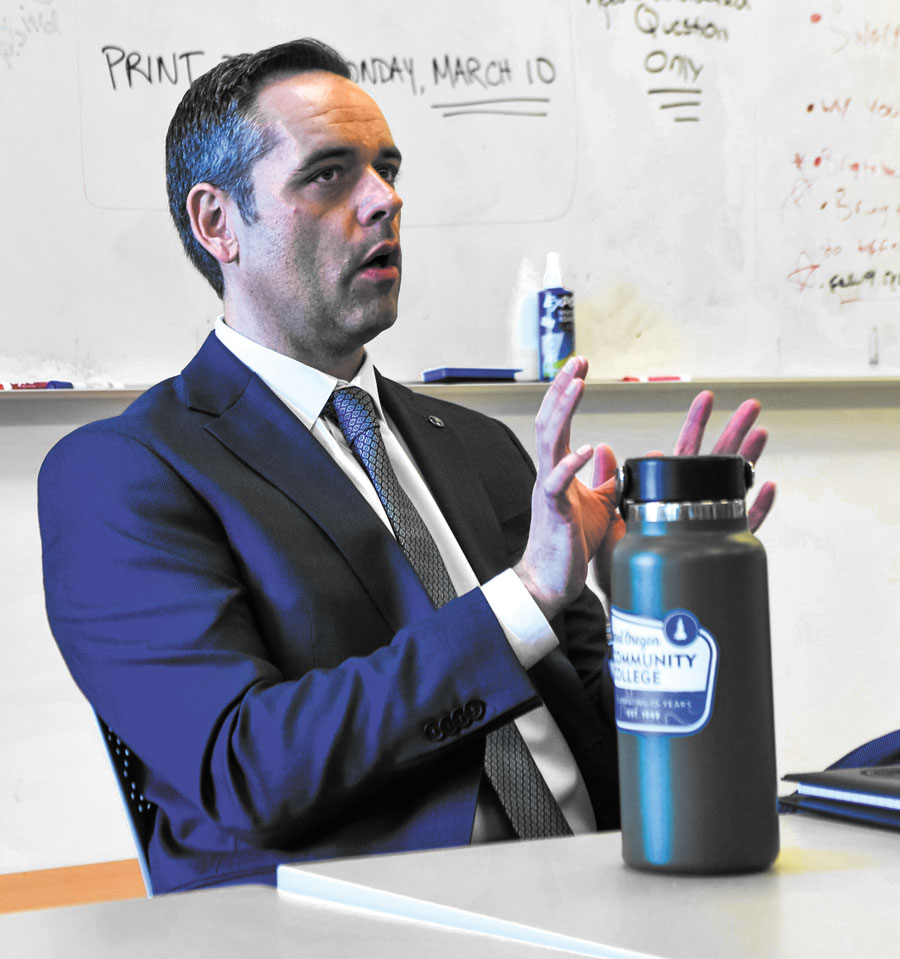What students initially thought was a Halloween prank, turned into the worst incident in recent college history, one that also tested Central Oregon Community College’s safety policy.
Shortly after midnight on Nov. 1, James Briles and Eric Norgaard, were in the dorm room they shared in Juniper Hall. Most of the other residence hall students were in their own rooms being quiet when they heard screaming and noises in the hallway. The students opened their own doors to find Briles in the hallway asking for help, bleeding from multiple stab wounds allegedly caused by his roommate, Norgaard. After Briles separated himself from Norgaard, Norgaard promptly returned to his dorm room where responders found him when they arrived minutes later. Originally the surrounding students thought it was part of a Halloween prank but quickly realized it was not.
This is the account of the Nov. 1 Juniper Hall stabbing as stated to The Broadside on Nov. 21, by director of housing life, Paul Wheeler.
Did the residents have a history?
James Briles was new to Central Oregon Community College fall term and Eric Norgaard was in his second year at the college. Both dorm students were new to Juniper Hall as of fall term, according to Ron Paradis, director of college relations at COCC.
To Paul Wheeler’s knowledge the two students did not know each other before being housed together.
Though Wheeler, director of housing life, was unable to comment if Briles and Norgaard had previous disagreements, he said “this year was unique in that we didn’t have space available and we were tasked more with relying on mediation techniques.”
If students identify to housing staff that they’re having issues with a roommate, resident assistants attempt to provide coaching skills and make sure students have talked to each other.
“99.9 percent are just upset and done and they haven’t talked with another person… encourage them to have that conversation,” Wheeler said.
If that conversation between the two students doesn’t happen, RAs intervene in the form of a mediation between students, according to Wheeler.
“Our hope is that they can find common ground so they (the roommates) can continue to live together.” Wheeler said. “When common ground cannot be found or both parties agree amicably it’s best to not continue living in same housing establishment. We try to change rooms when space is available.”
Prior training assisted in situation
This summer, COCC hosted an active shooter training on the Bend campus. Paradis believes the training helped the college build stronger relationships with local law enforcement, something he believes helped in this situation.
“I think that just helped to have folks have a sense of the campus. It was a good way for us to interact with law enforcement,” Paradis said. “Public Safety was quite pleased with the response time of local law enforcement.”
The call to Campus Security was received at 12:02 am and security responded within two minutes.
Prior to the on-campus active shooter training, COCC had only conducted table-top exercise for critical incidents where they discussed how different departments would respond to a variety of critical situations, Paradis explained.
Though Wheeler believes “nobody’s trained to handle incidents like this very well,” he credits prior RA training for their response in this situation. Prior to starting work fall term, RAs go through training with Campus Public Safety officers and meet the officers who work in later hours when situations typically arise on campus. During the training, RAs discuss situations that happen from confrontations with alcohol or marijuana possession to more critical incidents.
“The staff is trained that if they’re the first responders [to an incident] they contact other responders … and initiate the process before [offering aid],” Wheeler said.
After starting emergency response services, RAs are trained to assist with crowd control so nobody else is in danger and then hand over the situation to arriving responders, according to Wheeler.
As soon as the housing staff was made aware of the incidents they simultaneously contacted 911 by phone and Campus Public Safety through the walkie talkie system supplied for dorm staff.
“Campus Public Safety was complementary to housing staff for doing what they were supposed to do to get the police there,” Wheeler said.
Juniper Hall on the weekend
The night of the incident, two RAs were “on-duty.” This is typical staffing protocol for weekends at the residence hall, according to Wheeler.
During the week, the residence hall has one RA on duty from 8 p.m. until 2 a.m. During the weekend, the staffing increases two two on-duty RAs every evening due to Juniper Hall “traditionally seeing more activity on weekends,” according to Wheeler.
In total, the residence hall is staffed with six student RAs and a resident director all who live in the dorms in addition to Wheeler’s position as housing director–an off-campus position.
The weekend of the incident four RAs and the RD were in the building and all responded to the incident at different points.
Quiet hours begin at midnight, at which point, RAs are tasked with bringing the noise level down to a level conducive to studying and sleeping.
“RAs are on duty until 2 a.m. because we know student activity continues past midnight,” Wheeler said. “RAs are then permitted to go to their own dorm rooms so long as the building is quiet and calm…if not, they’re expected to bring that degree of control.”
During daytime hours on weekends, at least one RA is required to be in the building at all points to assist with any student needs throughout the day, according to Wheeler.
“Like any residence hall on weekends, it’s not a school night so students have more flexibility as to how they can spend their time because they don’t have to be in class the next day,” Wheeler said.
“Juniper hall is a small village, these things happen in small villages and larger cities,” Paradis said.
For on-going coverage of this incident and other on-campus news, go to thebroadsideonline.com.
Molly Svendsen | The Broadside
(Contact: [email protected])














